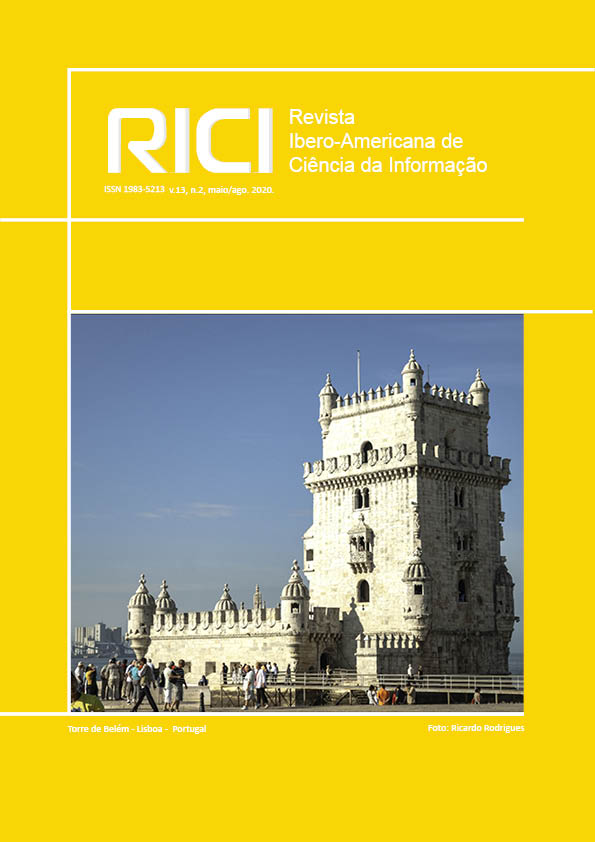Information Literacy as Praxis: an option for the cartographic approach.
DOI:
https://doi.org/10.26512/rici.v13.n2.2020.31220Keywords:
information literacy. praxis. Phenomenography. cartographic method. emancipation.Abstract
The present study approaches the Information Literacy in a critical theoretical perspective, aiming at the emancipatory development of the subjects, through the knowledge of the agencies and machinations that operate for the maintenance of a structure of exploration and domination through instrumentalization of the Reason in the relation Individual and Information. Proposing the information literacy as praxis and the cartographic method as a possibility for the construction of a critical approach. The objective was to understand the cartographic method as an option for the critical development of Information Literacy, oriented towards mediation and relational and ideological interactions that are operated through information. The research is characterized as bibliographic, with a literature review about information literacy and cartography; it was also sought to carry out a bibliographic survey through the Institutional Repository of the Brazilian Institute of Information in Science and Technology, finding a gap in academic productions in Information Science in this scope. It is considered that this method allows a propositional view of reality and attentive to its constructive processes, through an associative and transversal way, which allows the Information Literacy to put itself in other terms in the problem of emancipation in XIX century´s society through informational.
Downloads
References
AMERICAN LIBRARY ASSOCIATION. Report of the presidential committee on information literacy: final report. Chicago, 1989. Disponível em: http://www.ala.org/acrl/publications/whitepapers/presidential Acesso em: 27 abr. 2020.
BRUCE, Christine Susan. Information literacy: a phenomenography. 1996. Thesis (Doctor of Philosophy) - University of New England, 1996.
BRUCE, Christine Susan. Workplace experiences of information literacy. International Journal of Information Management, v. 19, n. 1, p. 33-47, 1999. Disponível em: https://www.sciencedirect.com/science/article/pii/S0268401298000450 Acesso em: 27 abr. 2020
CAMPELLO, Bernadete. O movimento da competência informacional: uma perspectiva para o letramento informacional. Ciência da informação, v. 32, n. 3, p. 28-37, 2003. Disponível em: http://www.scielo.br/pdf/ci/v32n3/19021 Acesso em: 27 abr. 2020.
DELEUZE, Gilles; GUATTARI, Félix. Mil Platôs: capitalismo e esquizofrenia. São Paulo: Editora 34, 1995.
DUDZIAK, Elisabeth Adriana. Information literacy: princípios, filosofia e prática. Ciência da Informação, v. 32, n. 1, p. 23-35, 2003. Disponível em: http://www.scielo.br/scielo.php?pid=S0100-19652003000100003&script=sci_arttext&tlng=es Acesso em: 27 abr. 2020.
GUATTARI, Félix. Caosmose: um novo paradigma estético. Tradução Ana Lúcia de Oliveira e Lúcia Cláudia Leão. Rio de Janeiro: Editora 34, 1992.
GUATTARI, Félix; ROLNIK, Suely. Micropolítica: cartografias do desejo. Petrópolis: Vozes, 1999.
HABERMAS, Jürgen.Técnica e ciência como ideologia. Lisboa: Edições 70, 1987.
HATSCHBACH, Maria Helena de Lima. Information literacy: aspectos conceituais e iniciativas em ambiente digital para o estudante de nível superior. 2002. 108 f. Dissertação (Mestrado em Ciência da Informação) ”“ Escola de Comunicação, Mestrado em Ciência da Informação, Universidade Federal do Rio de Janeiro, Rio de Janeiro, 2002. Disponível em: https://ridi.ibict.br/bitstream/123456789/722/1/mariahelena2002.pdf Acesso em: 27 abr. 2020.
MANHIQUE, Ilídio Lobato Ernesto; CASARIN, Helen de Castro Silva. Estrutura intelectual dos estudos da competência informacional na perspectiva fenomenográfica: uma análise por meio da citação e cocitação. Revista Iberoamericana de Ciência da Informação, Brasília, v. 11, n. 3, p. 751-768, 2018.
MARTON, Ference; SÄLJÖ, Roger. On qualitative differences in learning. I. Outcome and process. British Journal of Educational Psychology, v. 46, n.1, p.4-11, 1976.Disponível em: https://psycnet.apa.org/record/1977-00401-001 Acesso em: 27 abr. 2020.
MIRANDA, Jair Martins de. Samba global: o devir-mundo do Samba e a potência do carnaval do Rio de Janeiro ”“ análise das redes e conexões do samba no mundo, a partir do método da cartografia e da produção rizomática do conhecimento. Orientador Giuseppe Cocco, 2015. 360f. Tese (Doutorado em Ciência da Informação) ”“ Escola de Comunicação, Universidade Federal do Rio de Janeiro, Programa de Pós-Graduação em Ciência da Informação, Instituto Brasileiro de Informação em Ciência e Tecnologia, Rio de Janeiro, 2015. Disponível em: https://ridi.ibict.br/handle/123456789/963 Acesso em: 27 abr. 2020.
MORIN, Edgar. Os sete saberes necessários à educação do futuro. 2. ed. São Paulo: Cortez; Brasília, DF: UNESCO, 2000. Disponível em: http://arquivos.info.ufrn.br/arquivos/2012133176826a1035842e1211faee999/setesaberesmorin.pdf.pdf Acesso em: 27 abr. 2020.
NOGUEIRA, Marco Aurélio. Em defesa da política. São Paulo, Senac, 2001.
PASSOS, Eduardo; KASTRUP, Virgínia; TEDESCO, Silvia (Org.). Pistas do método da cartografia: a experiência da pesquisa e o plano comum. Porto Alegre: Sulina, v. 2, 2014. Disponível em: https://www.editorasulina.com.br/img/sumarios/652.pdf Acesso em: 27 abr. 2020.
PRADO FILHO, Kleber; TETI, Marcela Montalvão. A Cartografia como método para as ciências humanas e sociais. Barbarói, Santa Cruz do Sul, n. 38, p. 45-59, jan./jun. 2013. Disponível em: http://pepsic.bvsalud.org/pdf/barbaroi/n38/n38a04.pdf Acesso em: 27 abr. 2020.
SANTOS, Boaventura de Sousa. Estado e sociedade na semiperiferia do sistema mundial: o caso português. Análise Social, Coimbra,v. 21, n. 87-89, 1985, p. 869-901. Disponível em: https://estudogeral.sib.uc.pt/handle/10316/10834 Acesso em: 27 abr. 2020.
SVENSSON, Lennart. On qualitative differences in learning. III - Study skill and learning. British Journal of Educational Psychology, v. 47, p. 233-243, 1977. Disponível em: https://psycnet.apa.org/record/1979-07203-001 Acesso em: 27 abr. 2020.
WANDERLEY, Guilherme. A democracia impedida: o Brasil no século XXI. Rio de Janeiro: FGV, 2017.
Downloads
Published
How to Cite
Issue
Section
License
Copyright Notice
Authors who publish in this journal agree to the following terms:
- Authors retain copyright and grant the journal right of first publication with the work simultaneously licensed under the Creative Commons Attribution License 4.0, allowing the sharing of work and recognition of the work of authorship and initial publication in this journal.
- Authors are able to take on additional contracts separately, non-exclusive distribution of the version of the paper published in this journal (ex.: distribute to an institutional repository or publish as a book), with an acknowledgment of its initial publication in this journal.
- Authors are permitted and encouraged to distribute their work online (eg.: in institutional repositories or on their website) at any point before or during the editorial process, as it can lead to productive exchanges, as well as increase the impact and citation the published work.
















